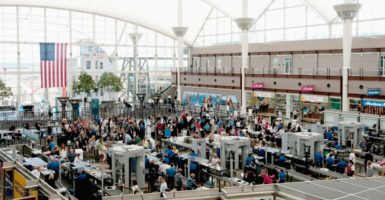Missed flights, long waits, and frustration boiling over: the summer travel season is upon us and the American people are fed up with one of the worst travel periods in recent memory.
Department of Homeland Security Secretary Jeh Johnson and the head of the Transportation Security Administration, Peter Neffenger, are pleading for help from Congress—and for patience from the American people.
The solution is not to create more bureaucracy for the TSA to mismanage.
Congress recently granted a request to reprogram existing funds to help hire over 700 new screeners and grant millions of dollars in overtime pay. The House Homeland Security Committee passed legislation to help bolster an expedited screening program, known as TSA PreCheck, along with other legislation that could help the TSA reduce wait times.
However, the TSA’s mismanagement created this crisis and the American people are paying the price. The solution is not to create more bureaucracy for the TSA to mismanage; but rather hold TSA leadership accountable.
The TSA should’ve seen these issues coming. According to the Congressional Research Service, the Federal Aviation Administration began forecasting years ago a significant increase in passenger travel. In addition, the TSA’s optimistic estimates for the number of passengers to go through expedited screening with TSA PreCheck failed to pan out. Despite all of this, the TSA requested less funding for airport screeners over the past four years.
In addition to failing to plan properly for these issues, the TSA has been rotting from the inside with pervasive misconduct and a culture of corruption. The Subcommittee on Oversight and Management Efficiency that I chair has been conducting an investigation into TSA misconduct—and the results are shocking.
Widespread misconduct occurs across airports and throughout the TSA, and some employees repeatedly are involved in misconduct without getting disciplined. Numerous whistleblowers told us about senior management officials allegedly committing serious misconduct and abusing internal policies. Misconduct at the TSA is pervasive and indicative of a corrupt organization.
Despite the record level of misconduct, in fiscal year 2015 alone, the TSA provided over $80 million in bonuses and performance compensation. The most senior TSA official responsible for security operations received over $90,000 in bonuses in a 13-month span from 2013 through 2014, despite his responsibility for a 95 percent failure rate in covert tests conducted by the inspector general’s office.
With many hardworking Americans still struggling to make ends meet, unchecked corruption at the TSA is unconscionable. The TSA can’t become an efficient and effective organization that keeps the traveling public safe if it rewards ineptitude and fails to hold employees at all levels responsible to high ethical standards.
More money to hire more people is the lazy answer; Congress must demand—and receive—more accountability from the TSA, not reward inept management.
This week, our subcommittee will release the findings of our investigation and include specific recommendations for the TSA. Additionally, we’ll convene a hearing on Thursday to examine the findings—including the extent to which misconduct occurs by TSA employees, how effectively TSA headquarters and airport management address misconduct issues, and opportunities to improve the integrity of the TSA’s workforce.
Before the TSA asks taxpayers to bail it out of a crisis for which its leadership is responsible, Administrator Neffenger must deal immediately with sweeping misconduct across the organization. Such action could immediately improve operations at checkpoints and help restore Americans’ broken confidence in the TSA. More money to hire more people is the lazy answer; Congress must demand—and receive—more accountability from the TSA, not reward inept management.





























